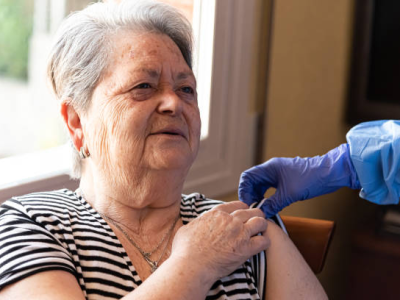Up to 18% of unvaccinated COVID-19 survivors have persistent symptoms as long as 2 years after infection, suggests an ongoing Swiss study published yesterday in BMJ.
University of Zurich researchers led the observational study, a comparison of 1,106 unvaccinated adults 6, 12, 18, and 24 months after COVID-19 infection with 628 uninfected controls. The team surveyed participants at eight time points about 23 long-COVID symptoms, their severity, and their perceived relevance to their infection.
Infected participants were, on average, 50 years old and had tested positive for wild-type COVID-19 from August 6, 2020, to January 19, 2021; 86.0% had had symptoms, and 4.3% had been hospitalized for their infections. Uninfected participants were, on average, 65 years old. Just over half (51.2%) of participants were women.
Most patients improved over time
Of all participants, 55.3% reported a return to health within 1 month after infection, and 17.6% said they had recovered within 1 to 3 months.
At 6 months, 22.9% of participants said they hadn't recovered, declining to 18.5% at 12 months and 17.2% at 24 months. Those reporting symptoms at 6 months said their symptoms had mild (16.2%), moderate (3.6%), or severe (2.7%) effects on their health. At 24 months, the severity of health impairment declined, with 10.4% reporting mild, 3.9% reporting moderate, and 1.9% experiencing severe health impairment.
Most participants reported that they continued to recover (68.4%) or had better overall health (13.5%) over time. But 5.2% said their health worsened, and 4.4% had periods of both recovery and regression.
A total of 8.9% of participants said they had symptoms at all four follow-up times, and 12.5% reported alternating symptomatic and symptom-free periods. Participants who reported symptoms or worsened symptoms at all follow-up points tended to be 65 or older (45.7% vs 34.1%) or have underlying medical conditions (58.8% vs 27.5%).
Relative to participants with unchanged or worse health status, a higher proportion of those who improved were younger than 65 years (55.6% vs 40.1%), and a lower percentage had post-exertion malaise (27.3% vs 40.6%) at 6 months.
Excess risk was 17% at 6 months
More COVID-19 survivors than controls had symptoms at 6 months (adjusted risk difference [excess risk], 17.0%). Excess risk for some symptoms in infected participants was 2% to 10%, with the greatest excess risks for altered taste or smell (9.8%), post-exertion malaise (9.4%), fatigue (5.4%), shortness of breath (7.8%), and impaired concentration (8.3%) and memory (5.7%).
The prevalence of symptoms was roughly the same at 6 months and 24 months—51.7% and 51.0%, respectively. But the prevalence of symptoms considered related to COVID-19 fell from 28.9% at 6 months to 20.3% at 12 months and 18.1% at 24 months.
Most participants reporting COVID-19 symptoms (89.2%) also reported nonrecovery at 24 months, but 5.8% said they had fully recovered. Fatigue, post-exertion malaise, altered taste or smell, shortness of breath, and impaired concentration or memory were the most common symptoms at all time points.
"Although not all adverse outcomes were necessarily attributed to COVID-19, our findings imply that a sizable number of people might be affected by post–COVID-19 condition and have protracted health issues for many months after infection," the study authors wrote. "Nevertheless, the rates of recovery and the overall improvement in the severity of participants' health impairment over time might also provide some hope for affected individuals."
The researchers said their findings highlight the value of infection prevention and underscore the need for effective treatments to reduce the burden on long-COVID patients and the healthcare system and for solidly designed future trials.
Although not all adverse outcomes were necessarily attributed to COVID-19, our findings imply that a sizable number of people might be affected by post–COVID-19 condition and have protracted health issues for many months after infection.
"Use of multiple outcome measures and consideration of the expected rates of recovery and heterogeneity in symptom trajectories are important in the design and interpretation of clinical trials," they wrote.
A 'global public health crisis'
In a related commentary, Qiao Wu, a PhD candidate at the University of Southern California, called long COVID "a global public health crisis" and said that future treatments, clinical trials, and policy interventions will depend on high-quality population-level data.
"Further studies focusing on more recent phases of the pandemic, and accounting for complexities (eg, more virus strains, vaccination statuses, and reinfections), will be particularly valuable," Wu wrote.
"Additionally, in view of the complexity of symptom trajectories and the unique disease burden experienced by each individual patient with post–COVID-19 condition, patients should be more closely involved in the design and conduct of these studies going forward."



















